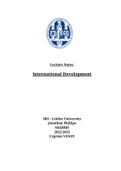Lecture Notes:
International Development
IRO - Leiden University
Jonathan Phillips
6442HID
2022-2023
Cyprien VENOT
,Introduction - What is Development (Class 1)
→ A lot in the field of international development (ID) is related to politics
- Politics: “Who gets what, when, how” (Lasswell)
I. What is development?
→ “Bringing to the dark places of the earth, the abode of barbarism and cruelty, the torch
of culture and progress” (Lugard)
→ “Manner in which people are able to live and die” (Dasgupta)
→ “Good change” (Chambers)
→ “The practice of development agencies” (Thomas)
Who are we developing?
→ Third world? Underdeveloped? Less-developed? Developing? Low and Middle
income? Global south? Everyone?
What are we developing?
→ Economic dev (GDP/capita)
→ Political (Democracy)
→ Social (Healthcare, education)
→ Subjective (Personal well being, happiness)
Development as Modernization theory
→ Linear transition from the same ‘traditional’ start to the same ‘modern’ end
→ Increasing GDP/capita, increasing urbanisation, increasing education
- “All good things go together”
Subjective development “Voices of the poor”
→ “Rich are those who are able to save and sell part of their harvest when prices rise”
→ “What one shouldn’t lack is the sheep, what one cannot live w/out is food grain”
→ “Most important is an extended and well-placed family network, from which one can
derive jobs, credit and financial assistance”
Development as Freedom (Sen 1992)
→ Freedom to do what: Participate in politics, engage in economic transactions, social
opp. through education and healthcare, transparency in interactions, security
→ What limits it: Poverty, violence/repression, poor public services, state restrictions,
lack of opportunities
→ Why does freedom matter:
- Intrinsic reason (freedom matters in itself
- Instrumental reason (freedoms promote other freedoms)
- E.g: democracy prevents famine…also matters for political freedom in itself
- E.g: Markets promote wealth…but also represent economic freedom itself
→ Not just freedom from interference (libertarianism, negative freedom):
, - Freedom - capabilities (positive freedom)
- E.g: capability to live a long life, to become a teacher…
→ Not just income - not all ends can be bought/needs vary
→ Not about what people do w/ their freedoms/capabilities
- People choose specific functionings
Ressource/commodities → freedoms/capabilities → functioning
(Needs/conversion) (Choice)
→ How do we choose those that matter?
- What democracy is for - but still 5 freedoms most important
- How do we choose under authoritarianism
→ Not just a normative question
- Politics is the conflict btw people who value diff dimensions of development
Development as Sustainable development
→ Development that meets the needs of the present without compromising the ability of
future generations to meet their own needs
→ Strong (natural capital does not fail) and weak sustainability (the sum of natural and
physical capital does not fail)
Sustainable development
→ Are continued economic growth and environmental sustainability compatible
→ The ‘Development’ route to sustainability
- Rapid technological innovation will help us solve problems like climate change
- Wealth and education reduce fertility, reducing environmental pressures
- Kuznets curve
→ Sustainability route to development
- Tackling env. challenges will stimulate new innovations and investments
- Conserving assets improves their productivity, eg new medical cures in the
rainforest
- Avoiding climate stresses prevents conflicts and boosts yields
Post-Development critiques
→ The discourse of ‘Development’ makes people think of themselves as ‘underdeveloped’
- “Poverty is a myth, a construct and this invention of a particular civilization”
(Rahnema)
- Rejecting Modernization theory: more is not always better
→ Development is an imposition of power and hierarchy
- A ‘weapon’ of the cold war and post-colonialism
- Development as ‘planned poverty’
- “A top-down ethnocentric and technocratic approach”
- Westernization and eradicating diversity
, → Development has failed on its own terms
- Rising inequality
- ‘Delusions and disappointment, failures and crimes have been steady companions
of development and they tell a common story: it did not work”
→ Development is an industry
- 152.8 Billion (OECD, 2019)
- Govts, NGOs, BINGOs, profitable companies, foundations
- Reliant on the continuation of poverty
- Lobbying governments for new contracts
- Govts seeking markets for their companies
- A career for you?
II. How do we measure development?
→ Challenges: multi-dimensional/frequent, lack of data collection capacity in the
countries that matter most, representative data on the most vulnerable is challenging,
hard to attribute progress to specific policies when many things change at the same time
Multidimensional poverty index
→ Are the people who lack income also the people who lack healthcare?
→ Multidimensional poverty index (MPI) = % of people who are poor in at least a third of
indicators (Health, education, living standards)
Sustainability:
→ HDI/MPI - reward resource use, ignore consequences for future generations
→ Ecological footprint
- How much biologically productive area it takes to provide for all the competing
demands of people” (in hectares)
- 1.75 earths would be required to support current activities (5 earths if USA)
II. Are we making Progress in Development
See graphs
Conclusion
→ Def of dvlpmt is contested: dvlpmt as competing interests of many “freedoms”
→ Including freedoms of future generations (sustainability)
→ ‘Development’ actors are not neutral
→ Many imperfect measures → all are simplifications and value judgments
→ Developing quickly but very unevenly and w/ recent reversals
→ Poverty is increasingly concentrated in Africa




